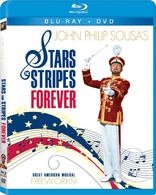Stars and Stripes Forever Blu-ray Movie
HomeStars and Stripes Forever Blu-ray Movie 
Blu-ray + DVD20th Century Fox | 1952 | 89 min | Not rated | Dec 13, 2011
Movie rating
7.3 | / 10 |
Blu-ray rating
| Users | 4.5 | |
| Reviewer | 3.5 | |
| Overall | 3.9 |
Overview
Stars and Stripes Forever (1952)
An entertaining biography of the "March King" John Philip Sousa, the man who gave the world some of its most stirring music.
Starring: Clifton Webb, Debra Paget, Robert Wagner, Ruth Hussey, Finlay CurrieNarrator: Max Showalter
Director: Henry Koster
| Music | Uncertain |
| Biography | Uncertain |
Specifications
Video
Video codec: MPEG-4 AVC
Video resolution: 1080p
Aspect ratio: 1.37:1
Original aspect ratio: 1.37:1
Audio
English: DTS-HD Master Audio Mono (48kHz, 24-bit)
Spanish: Dolby Digital Mono
Subtitles
English SDH, French, Spanish
Discs
50GB Blu-ray Disc
Two-disc set (1 BD, 1 DVD)
DVD copy
Playback
Region free
Review
Rating summary
| Movie | 3.5 | |
| Video | 5.0 | |
| Audio | 4.0 | |
| Extras | 2.5 | |
| Overall | 3.5 |
Stars and Stripes Forever Blu-ray Movie Review
Mostly pomp, little circumstance.
Reviewed by Casey Broadwater February 22, 2012Forget Jaws and Independence Day and Armageddon; if there's one film that deserved to be released on the Fourth of July
weekend, it's Stars and Stripes Forever, the liberty-taking biopic of bandleader and "March King" John Philip Sousa, America's key composer of
rah-rah patriotic anthems, including "Semper Fidelis"--the official march of the U.S. Marine Corps--and, of course, the title song, the National March of
the United States and a staple at parades and presidential appearances, college football games and fireworks displays. Yet, like other "summery" films
released in the doldrums of winter to provide some sunny escapism, Stars and Stripes Forever actually debuted in December, 1952, and now--
59 years later--has arrived on Blu-ray around the same time, like a gloom-dispelling blast of cheer. If there's one sure cure for Seasonal Affective
Disorder it's a jaunty shish-boom-bah, baton-twirling march, right?
Okay, so maybe not. Still, Stars and Stripes Forever is an old-fashioned feel-good experience, a celebration of one of the country's greatest
composers and a flash back to simpler times--the turn-of-the-century Late Romantic period--when American jingoism was still totally in vogue.
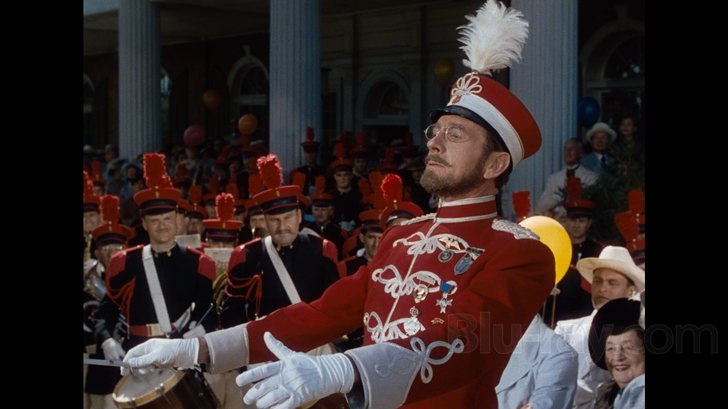
Clifton Webb--the star of The Razor's Edge, Otto Preminger's Laura, and the original Cheaper by the Dozen--dons the famed bandleader's iconic white gloves, be-tasseled uniform, and pince-nez glasses to portray Sousa as a brilliant showman whose military precision can't fully disguise his love for panache and spectacle. Stars and Stripes Forever opens in the early 1890s, when Sousa is still the leader of the Marine Corps Band. He's a family man and devoted father, and in one of the early scenes we see him come to his wife, Jennie (Ruth Hussey), with sheet music for a tender love ballad he's just written: "Semper Fidelis." As he belts out the words in a comically sonorous voice--he's no singer, that's for sure--she plinks out the accompaniment on the piano, trying to keep from cracking up. It's obvious that the song was never meant to be a crooned love tune, and Jennie gives him the idea to pick up the tempo and play it as a proper march.
In reality, this wasn't how the song was written at all--it was commissioned by then-President Chester Arthur as a replacement for "Hail to the Chief"-- but Stars and Stripes Forever plays rather loosely with history in order to add some pep to Sousa's somewhat bland biography. One of the major fictional additions to the story is the insubordinate Private Willie Little (Robert Wagner), who charmingly insinuates himself in Sousa's life by inventing the Sousaphone, a modified tuba with a big bell and a rounder sound. (In actuality, Sousa invented the horn himself.) When Sousa quits the Marine Corps to form his own traveling band, Willie comes along as an integral member. He's engaged to the similarly made-up Lily Becker (Debra Paget), a mildly risqué dancer and aspiring singer, and the two essentially function as the source of light drama in a film that would otherwise be severely short on it.
After Ray and Walk the Line and Control, modern audiences expect musical biopics to explore creativity fueled by inner torment, but this simply isn't that kind of film. Sousa led a rather comfortable life, unperturbed by tragedy or self-destructive personality problems. At worst, he was stuffy and old-fashioned and repressed--normal Victorian-era traits, all--but for the most part here, he's made out to be a genial, good- natured guy. A demanding musical task-master, sure, but not a cruel one. The other performers are great--Ruth Hussey, in particular, makes for a perfectly loving Victorian wife--but Clifton Webb is the star of this show. He is Sousa--fussy and intelligent, a perfectionist and a subtle showman. The problem with Sousa's life, storytelling-wise, is that not much happened to him. There's strikingly little adversity in Stars and Stripes Forever. The closest the film comes to conflict is a subplot about Willie and Lily getting secretly hitched. Sousa, who, for puritanical reasons, has a hang-up about couples going on tour together, is positively shocked when he discovers that the two have been rendezvousing in a train compartment at night for--gasp!--marital relations.
The film does wring some humor out of the quaint Victorianism of Sousa's age, but it can't squeeze a story out of it. Instead, Stars and Stripes Forever contents itself to follow the basic outline of Sousa's life during the 1890s, when he pieced together his band from the world's best players and set about touring the globe. We're treated to a continent-hopping concert montage and a virtual parade of Sousa's greatest hits. In one of the best scenes, his band makes an unexpected appearance at the Cotton States Exposition in Atlanta, where Sousa promises the excited crowd of Southerners that he'll play "Dixie" between every other number. Then, in a brilliantly conciliatory let's all get along move, he bring out an all- black choir to assist the band with a performance of a song usually associated with President Lincoln, "The Battle Hymn of the Republic." He may have been old-fashioned in some ways, but he knew how to stir the pot, and he was a genius at putting on a good show.
And that's what Stars and Stripes Forever is, essentially--a good show, all spectacle and little plot. And that's okay, so long as you're not expecting something more substantive. (Or a comprehensive biography. Sousa's own life is unfortunately overshadowed here by the Willy/Lily subplot.) It's happy and wholesome--the film has a kind of Disneyland innocence, for a lack of a better description--and it bubbles along in a series of infectious musical numbers. The parasol-twirling showpiece is a rousing stage rendition of "The Bowery," which isn't even a Sousa song, but was presumably added to the film to help it compete with other showy musicals of the 1950s. Though Sousa continued composing into the 1920s, the film only takes us up to the Spanish-American War, the production of Sousa's operetta, El Capitan, and the debut of the titular "Stars and Stripes Forever," the composer's most patriotic and recognizable march. Listen for it as the film starts, in place of the usual 20th Century Fox fanfare.
Stars and Stripes Forever Blu-ray Movie, Video Quality 
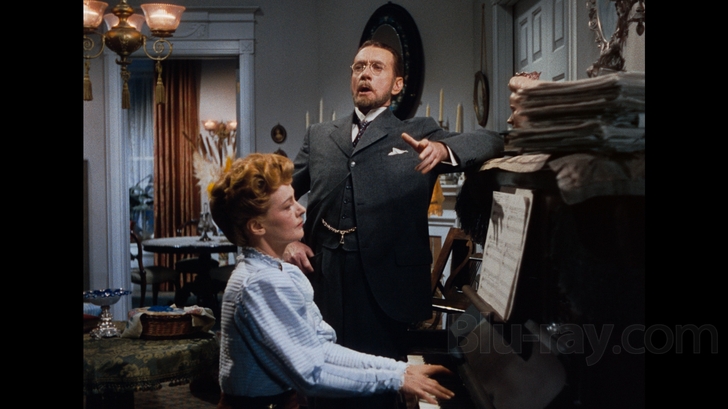
Gorgeous, gorgeous, gorgeous Technicolor. That's really all you need to know, but for the sake of clarity, I'll elaborate. 20th Century Fox has given Stars and Stripes Forever a truly comprehensive restoration, resulting in a 1080p/AVC-encoded transfer that—I have no qualms saying this—probably looks better than the film ever looked in theaters, when you factor in the print damage inevitably involved when you project a film numerous times. In contrast, there's not a single speck on this print. No hairs or bits of debris, no stains, no brightness fluctuations—just a stable, pristine, extremely good-looking picture. I don't have any details about exactly how the film was restored, but I imagine it involved a frame-by- frame tidying up. And yet, there's no trace of the preservationists' handiwork—no compression issues, no digital artifacts, or at least none that you'd notice without a good deal of pixel peeping. Furthermore, film grain has been entirely preserved—no texture-erasing DNR here—and there are no halos, harsh outlines, or other signs of edge enhancement. The picture looks simply wonderful in high definition. For an example of how crisp the image is, look no further than the gold epaulets and tassels of Sousa's Marine uniform. Fantastic. Of course, we have to say something about those beautiful Technicolor tones—rich and bold, with soft creamy highlights. They certainly don't make 'em like they used to.
Stars and Stripes Forever Blu-ray Movie, Audio Quality 
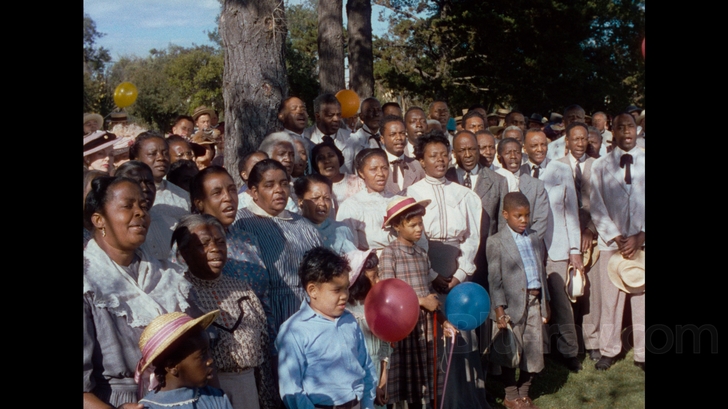
Purists will be pleased to see that the film's original mono soundtrack has been preserved in uncompressed Linear PCM 1.0 form, but there are definitely times when those with multi-channel home theater set-ups will crave a more immersive mix. John Philip Sousa's larger-than-life marches just cry out for a full-on 7.1 presentation, and though technical limitations probably keep this from ever happening, it's easy to imagine feeling completely surrounded by Sousa's band—the martial drums and tweeting flutes, the bright brass and deep, resonant sousaphone. All of which sound good here-- great even, for a 1.0 mix--but you can't help wishing you were being sonically assaulted from all sides. Oh well. It is what it is. Thankfully, this track is clean and well-rounded, with none of the tinniness or brashness you sometimes expect from mid-century films. Likewise, dialogue is always clear and balanced, although you'll occasionally notice that for the vocals to stand out, the music has to be potted unrealistically low. The disc includes optional English SDH, Spanish, and French subtitles, in easy to read white lettering.
Stars and Stripes Forever Blu-ray Movie, Special Features and Extras 
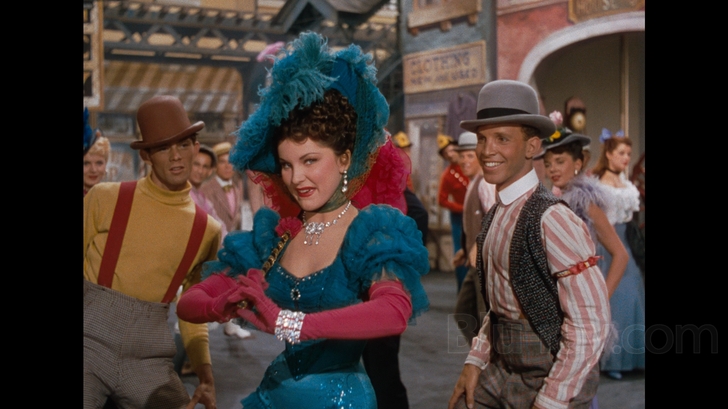
- From Our National March to the Silver Screen (SD, 16:38): A series of Sousa and 20th Century Fox experts discuss the film, it's place in history, and how it compares to the bandleader's actual biography.
- John Philip Sousa's Contribution to American Music (SD, 6:39): Some of the same experts talk about Sousa's legacy and innovations.
- U.K. Alternate Main Title Sequence (SD, 1:39): In the U.K. the film was released as Marching Along, and here we get to see a black and white version of the opening sequence.
- Galleries: Includes an interactive pressbook gallery, an advertising gallery, and a stills gallery.
- Trailers (1080p, 6:11)
- Booklet: Inside the case you'll find a 14-page booklet with photos, actor bios, and information about the film.
Stars and Stripes Forever Blu-ray Movie, Overall Score and Recommendation 
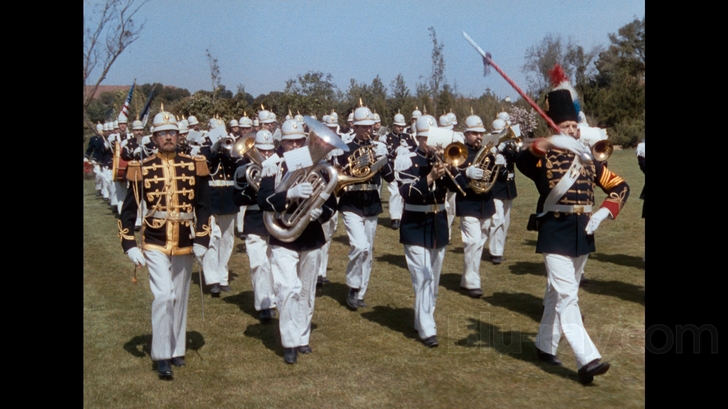
Stars and Stripes Forever is far from the best mid-century 20th Century Fox musical--it's a bit too short on story--but it earns a lasting appeal with winning march tunes, good old fashioned Victorian innocence, and a spot-on performance by Clifton Webb, who is John Philips Sousa, down to the tidy mustache and pince-nez glasses. Fox's Blu-ray restoration of the film is spot-on too, with Technicolor visuals that are gorgeous in high definition. Recommended for all band nerds--I use the term lovingly--and fans of late 19th century American music.
Similar titles
Similar titles you might also like

Clambake
1967

Evita
15th Anniversary Edition
1996

Carmen Jones
Fox Studio Classics
1954

Hamilton
2020

De-Lovely
Special Edition
2004

Get on Up
2014

Victor/Victoria: The Broadway Musical
1995

A Chorus Line
1985

Jesus Christ Superstar
1973

The President's Lady
Limited Edition
1953

Godspell
1973

Springsteen & I
Bruce Springsteen
2013

The Personal History of David Copperfield
2019

The Cocoanuts
1929

Britney Spears Live: The Femme Fatale Tour
2011

Million Dollar Mermaid
Warner Archive Collection
1952

Gypsy
Warner Archive Collection
1962

A Quiet Passion
2016

Anchors Aweigh
1945

The Great Ziegfeld
Warner Archive Collection
1936
